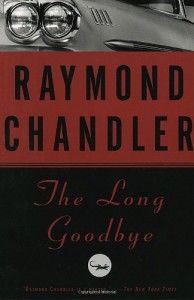The Long Goodbye

10/22/13:
Again, 5. My thoughts remain about the same concerning its quality and the special attention paid to the lonely details of Marlowe's life. The parallel between Marlowe and Mrs. Wade concerning their relationships with Lennox was nicely done.
1/20/11:
The Private Dick, or Detective, is a common archetype as familiar to us as "It was a dark and stormy night," and potentially as tired. I've seen plenty of the movies and read plenty of the short stories and parodies that have descended from the genre...but I'd never read the real thing.
I'm more familiar with the British Detective, a different breed of creature entirely, there's always an aloof distance between the reader and the detective there, which sticks in my craw still despite efforts by some to modernize the genre.
Philip Marlowe is anything but aloof. His motives are directed more from personal relationships with the people involved in the cases rather than JUSTICE or LAW. Clever, and a smart man, Marlowe is more likely to be a smart-alec than a wit and relies less on deduction and more on perseverance and luck. Marlowe takes a lot of kicks and slaps in getting his answers, but he always strikes back when it matters most. And fuck, the guy is smooth.
The success of 'The Long Goodbye' is hands down due to Chandler's rich writing. The plot is solid, but it is the arresting imagery and jaw-dropping simile and dialogue that sounds so tossed off and, while forever verging on the ridiculous, dead-perfect. I'm not going to bother quoting passages. Any bookstore will order it for you, if it isn't already on hand.
The book was apparently written at a dark time in Chandler's life, his wife dying of cancer and all, which comes through in the contemplative scenes of Marlowe sitting alone in a bar, or at home over a chess puzzle. Having been published in the early 1950s, there's plenty of things that wouldn't exactly fly these days, from 'frails' to knife-fondling Latinos, but it all adds to the reality of his setting. Chandler writes about a stylized post-war Los Angeles that both romanticizes and tears down our preconceived notions about the era. He wasn't about to leave his and his character's opinions to subtext and allusion.
I can't believe I stayed away from the genre for so long. Reading this was like rediscovering classics films all over again: style, class and just the right amount of shadows. I may reconsider those five stars after I've read a few more of these, but I don't think so.
Philip Marlowe
Next: 'Playback'
Previous 'The Little Sister'
My review of 'Later Novels and Other Writings'













